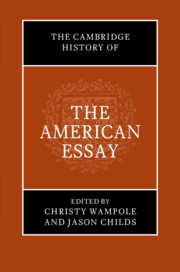Book contents
- The Cambridge History of the American Essay
- The Cambridge History of the American Essay
- Copyright page
- Contents
- Acknowledgments
- Notes on Contributors
- Introduction
- Part I The Emergence of the American Essay (1710–1865)
- Part II Voicing the American Experiment (1865–1945)
- Part III Postwar Essays and Essayism (1945–2000)
- 20 The Essay and the Twentieth-Century Literary Magazine
- 21 Germans in Amerika: Written Possibility, Uninhabitable Reality
- 22 The Essay and the American Left
- 23 The Native American Essay
- 24 Conservatism and the Essay
- 25 Opinions and Decisions: Legal Essays
- 26 World War Two to #MeToo: The Personal and the Political in the American Feminist Essay
- 27 Self-Portraits in a Convex Mirror: The Essay in American Poetry
- 28 The American Essay and (Social) Science
- 29 Philosophy as a Kind of Writing
- 30 The Essay and Literary Postmodernism: Seriousness and Exhaustion
- Part IV Toward the Contemporary American Essay (2000–2020)
- Recommendations for Further Reading
- Index
30 - The Essay and Literary Postmodernism: Seriousness and Exhaustion
from Part III - Postwar Essays and Essayism (1945–2000)
Published online by Cambridge University Press: 28 March 2024
- The Cambridge History of the American Essay
- The Cambridge History of the American Essay
- Copyright page
- Contents
- Acknowledgments
- Notes on Contributors
- Introduction
- Part I The Emergence of the American Essay (1710–1865)
- Part II Voicing the American Experiment (1865–1945)
- Part III Postwar Essays and Essayism (1945–2000)
- 20 The Essay and the Twentieth-Century Literary Magazine
- 21 Germans in Amerika: Written Possibility, Uninhabitable Reality
- 22 The Essay and the American Left
- 23 The Native American Essay
- 24 Conservatism and the Essay
- 25 Opinions and Decisions: Legal Essays
- 26 World War Two to #MeToo: The Personal and the Political in the American Feminist Essay
- 27 Self-Portraits in a Convex Mirror: The Essay in American Poetry
- 28 The American Essay and (Social) Science
- 29 Philosophy as a Kind of Writing
- 30 The Essay and Literary Postmodernism: Seriousness and Exhaustion
- Part IV Toward the Contemporary American Essay (2000–2020)
- Recommendations for Further Reading
- Index
Summary
This chapter focuses on the canonical essays that theorized in real time the new stylistic and thematic tendencies in American postmodern fiction. Since the late 1960s, prominent practitioners of postmodernist fiction have been at the forefront of critical debates over contemporary American narrative. From the 1960s to the 1990s, brilliant authors such as Raymond Federman, John Barth, Ronald Sukenick, and David Foster Wallace engaged in essayistic reflections on the problem of innovation in American fiction, including Barth’s “The Literature of Exhaustion” and Wallace’s “E Unibus Pluram: Television and U.S. Fiction.” Despite differences and generational distance, in some of their best essayistic writing these writers often focused on the (old) problem of “the new” in art, reframed as a discourse on the making or unmaking of the postmodernist aesthetic in response to a supposed exhaustion of literary language. They did so from a liminal position, namely from the ambivalent stance of the writer-critic, and ended up producing some of the most penetrating essays on contemporary American literature during this period, indelibly marking an era in the history of the American essay.
Keywords
- Type
- Chapter
- Information
- The Cambridge History of the American Essay , pp. 509 - 524Publisher: Cambridge University PressPrint publication year: 2023

